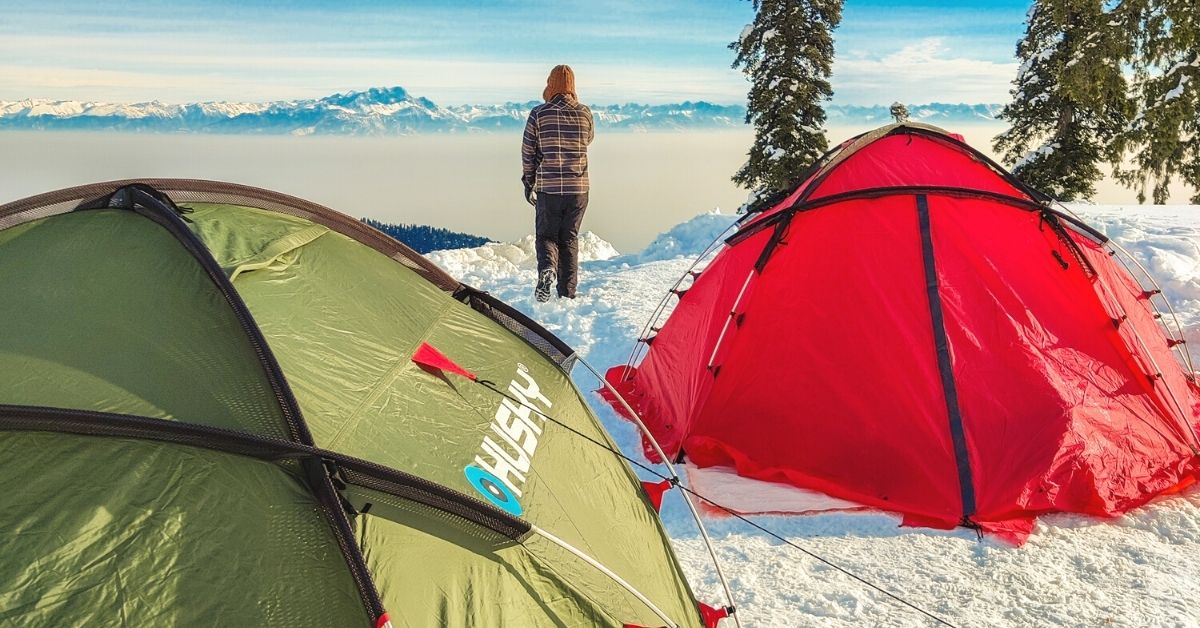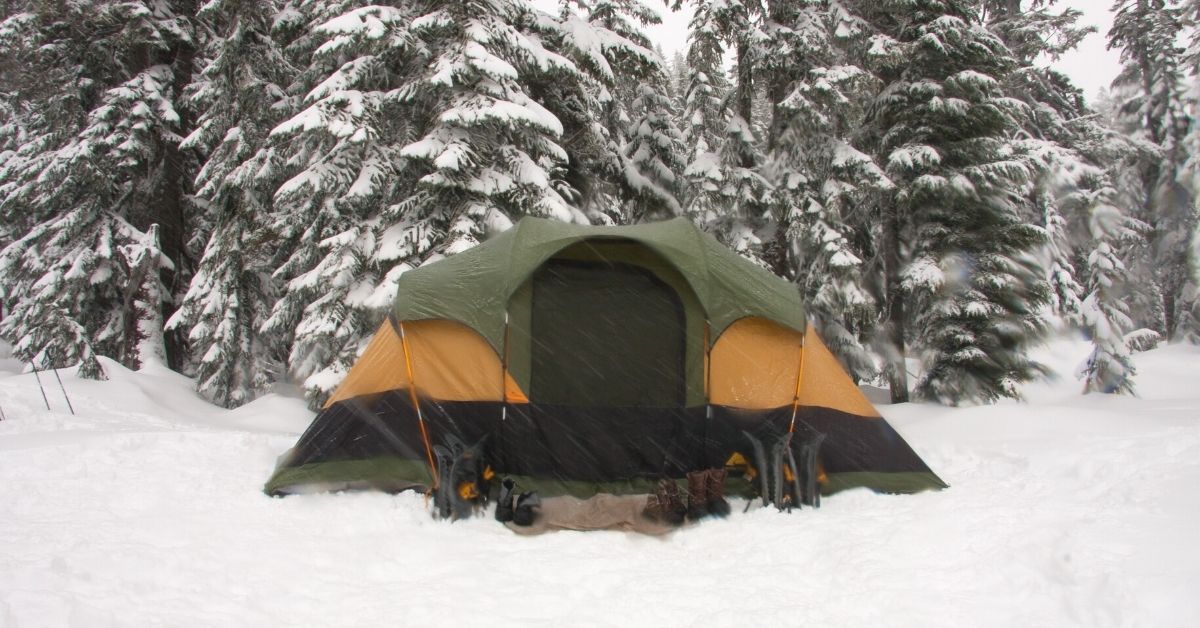If you’ve ever camped out during the winter in a cold climate country, you’ll know that sometimes, no amount of layers can keep you warm at night.
If you’re going on camping trips regularly in these low temperatures, you might want to consider investing in a tent heater.
Now, I’m sure you have wondered, “are tent heaters safe inside a tent?” This is an understandable concern considering tents and camping bedding can be flammable.
Plus, tents are small, so it isn’t easy to place a heater away from all materials.
In answer to your query, tent heaters can be safe, provided you use one specifically designed for use within a tent, and you take precautions when using it.
For example, put it as far away from any bedding or clothing as possible and turn it off before you go to sleep.
So how do you determine how safe a tent heater is? Here are a few things you should consider when shopping for a safe camping heater.

How To Find Heaters Safe For Tents
Before being able to find a safe heater, you’ll need to learn a little more about the two different types and how they can affect different environments.
Electric Heaters VS Gas Heaters
Before you buy a tent heater, you should understand the difference between gas and electric versions.
Both can be a fire hazard if left unattended or close to flammable objects. However, each type has its pros and cons.
Gas Heaters
Gas (propane) heaters are often the most convenient choice as they don’t require power to work.
Plus, as they are cordless, they are easy to carry around the campsite with you, keeping you warm wherever you go.
They also heat up quicker than electric heaters, warming up cold spaces very quickly.
Unfortunately, gas heaters can emit toxic gases like carbon monoxide, which can lead to poisoning.
There is also a risk of oxygen depletion when using a gas heater in a small enclosed space like a tent, as they can consume a lot of oxygen.
However, the good news is that many modern propane tent heaters have safety features to reduce these risks. Even so, it’s still something you should be aware of.
Electric Heaters
The best thing about electric heaters is that they do not produce any toxic gases or consume oxygen. You also don’t have to purchase and change the fuel tank as you do with gas heaters.
However, you can only use an electric heater if your campsite has an electricity outlet. You’ll also most likely need an extension lead to connect it up to the power.
Moreover, they can use a significant amount of energy, and your campsite might not have a strong enough electric draw.
Safety Features To Look For
Thankfully, heaters now have many safety features to prevent accidents or emergencies. Here are a few safety features that are useful to look for when choosing a tent heater.
Tipping Shutoff
Both gas and electric heaters have a risk of tipping over, which could potentially start a fire.
However, the best heaters safe for tents will have a safety tipping shutoff feature that will instantly switch the fire off if it tips.
This function drastically reduces the chance of danger, so it is a must when choosing a safe camping heater.
Auto Shutoff Timer
Another vital safety function that makes camp heaters safe in a tent is an auto-shutoff timer. With this feature, the heater will shut off after a specific amount of time, usually an hour.
Therefore, should you doze off with the heater still on, you’ll be in a much safer position.
ODS (Oxygen Depletion Sensor)/ CSA 4.98 Certification
If you decide to buy a gas tent heater, you absolutely should ensure it is CSA 4.98 certified.
All propane heaters with this certification have an oxygen depletion sensor that could save your life.
It triggers an alarm and shuts off if the oxygen levels in your tent become too low. This sensor can also prevent carbon monoxide levels from getting too high.
However, even with this sensor, you should practice safety measures such as not leaving it unattended and creating some ventilation in the tent.
Other Ways To Keep Camp Heaters Safe In A Tent
So now, when you think, “are tent heaters safe to use?” you probably understand that even camping heaters with safety features still pose some risk.
Therefore, part of making heaters safe for tents is taking special care and precautions.
Choose A Safe Placement For Your Heater
Although most modern camp heaters don’t create a flame, they get hot enough to cause a fire if they touch flammable materials.
Therefore clear ample space around it and ensure it is not near the tent’s opening so no one cannot knock it over.
Ensure There Is Sufficient Ventilation
You should ensure your tent has ventilation regardless of which type of heater you use, and especially with propane ones.
The easiest way to do this is to leave the tent zipper open by a few inches.
Don’t Leave It Unattended
Lastly, remember to switch the heater off whenever you leave the tent, even if you go to the toilet or pop into the camp kitchen.
The 3 Safest Tent Heaters
Now that we’ve gone over the difference in heaters, what safety features to look for, and also some great safety tips, here are my top 3 safe tent heater suggestions to check out.
Mr. Heater Buddy Indoor-Safe Portable Propane Radiant Heater
The Mr. Heater Buddy propane heater is a safe and durable option for heating large tents as it can warm indoor spaces up to 225 square feet.
It has low and high heat settings and features an emergency low oxygen safety system with a carbon monoxide alarm. Other safety functions include a tip-over shut-off and a thermal shutdown system.
This propane heater runs on a 1 lb. propane cylinder with a swivel regulator. It gives over 5 hours runtime when used on low, or 2.4 hours on the highest setting.
It’s super easy to use, too. Fit the gas cylinder, turn the knob to the pilot setting and push inwards to light it. You can then adjust to low or high as needed.
It has an easy-grip handle and heavy-duty construction, including a tough wire guard. Therefore, it is easy to transport and can take a beating.
However, one thing to note about this safe camping heater is that it may not work in high altitudes (over 7,000 FT above sea level).
Little Buddy Indoor Safe Propane Heater
This Little Buddy indoor propane heater is another safe and superb propane heater to consider for your camping trips.
It’s smaller than Mr. Heater, warming spaces up to 95 square feet, which is still sufficient for most campers. It creates heat up to 3,800 BTU/hr and distributes it at a 45-degree angle.
It has all the necessary safety features, such as a low-oxygen sensor and alarm, tip-over switch, and an auto-shutoff function.
Another thing I like about Little Buddy is that it doesn’t create any foul odors as some gas heaters do.
This heater is compatible with 1-pound disposable propane cylinders, which can provide over 5 hours of runtime.
There is only one heat setting, so it could not be any easier to light, as you simply switch it from off to on.
Furthermore, its compact size of 11 x 11 x 11 inches makes it ideal for hanging off your backpack, as you can loop the handle in your backpack’s straps.
Like with Mr. Heater, Little Buddy works in altitudes up to 7000 feet above sea level.
Also, take note that you need to provide a ventilation area of no less than 4 square inches during operation.
Honeywell 360 Degree Electric Fan Heater
If you prefer an electric tent heater, this Honeywell space heater has many features to ensure effective and safe heating.
It uses 360-degree fan forced technology to distribute heat all around.
Yet, thanks to the flame-resistant cool touch plastic housing, the exterior never gets too hot.
The Honeywell electric heater boasts tip-over prevention, an auto-off timer option, two heat settings, and a programmable thermostat.
Plus, there is double protection from overheating, with an overheat sensor and backup cut-off fuse.
The indoor heater is made from high-quality materials, including soldered heating element connections and high-grade silicone-covered wiring.
It also comes with a UL-rated power cord to connect up to the electricity source at your campsite.
Measuring 8 x 8 x 11.5 inches, it’s one of the tiniest portable heaters you can find and has a small carry handle for extra portability.
As it doesn’t use a propane cylinder, finding a power source to plug it into is the most challenging part of using this.
Once you’ve connected an extension lead to the campsite’s power source, turn the switch from 0 to low or high and then set the thermostat to your preference.
Final Thoughts
We hope this guide has addressed your thoughts about ‘are tent heaters safe,’ and you now feel more confident in heating your tent during your winter camping trips.
By choosing a high-quality tent heater with safety features like the ones in this article, you’ll no longer have to shiver in your sleeping bag or put up with cold feet!
Make sure to also get the correct blankets for your next camping adventure in the cold. Here are the 5 best wool camping blankets to keep you warm!



